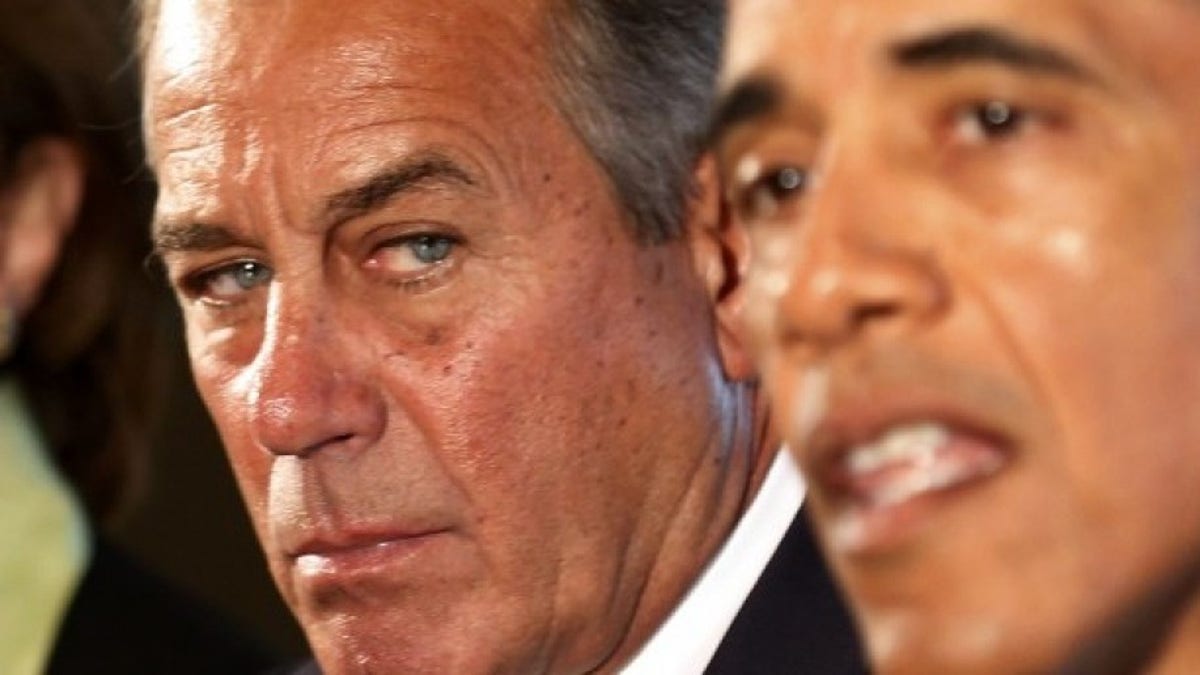
U.S. Speaker of the House John Boehner listens as President Barack Obama hosts a bipartisan meeting of Congressional leaders in the Cabinet Room of the White House in Washington, January 13, 2015. REUTERS/Larry Downing
Lawmakers are pushing legislation that could result in theselling off of 266 million barrels of oil from thecountry’s Strategic Petroleum Reserve (SPR) overthe next decade, mostly to fund more government spending.
Legislation for health care, highway funding and financing thegovernment could end up drawing on down on oil supplies meant foremergency situations. If all three bills are signed into law, some266 million barrels, or nearly 40 percent, of the current 695million barrel SPR would be sold off in the next decade to raiseabout $23 billion.
“The 114th Congress has introduced threeseparate bills that would fund non-energy policy goals by mandatingcrude oil sales from the Strategic Petroleum Reserve,â€according to an analysis by the consulting firm ClearViewEnergy.
ClearView noted the health care bill, called the 21st CenturyCures Act, was the least likely to hit President BarackObama’s desk despite passing out of the Housewith a veto-proof majority. On the other hand, the two other billspassing a budget and funding highways are more pressing issues to Republican andDemocratic lawmakers. Just those two bills alone would draw down on186 million barrels.
“Elected officials could face grave politicalpenalties for failing to raise the debt ceiling or fund highwayconstruction, but voters aren’t likely to noticethe absence of [200 million barrels] of crude oil from salt cavernsthey can’t see,†ClearViewnoted.
“Moreover, swollen global inventories andfalling oil production system capacity utilization tend to bluntthe edge of geopolitical risk, which probably makes it easier forCongress to drill for dollars in the SPR,†theconsulting firm added.
Calls to sell of SPR oil come amid a resurgence of crude oilproduction in the U.S. thanks to hydraulic fracturing andhorizontal drilling. As crude output has boomed, U.S. lawmakershave called for a repeal of the crude oil export ban and otherpolicies to help keep America’s energy boomgoing.
But a consequence of the fracking boom is the SPR has lost someof its importance. With booming crude production, lawmakers canpolitically afford to sell strategic oil reserves to fundgovernment programs.
The White House called the budget bill “aresponsible agreement that is paid for in a balancedway.â€
Republican leadership negotiated the budget deal behind closeddoors with White House officials and Democrats. The budget billincludes about $80 billion in spending increases — about $76billion of which are offset by spending cuts and revenue increases,according to the Congressional Budget Office.
Some Republican lawmakers are hesitant to support the budget,citing concerns over backroom dealings and that not all spendingincreases are offset. Some lawmakers were furious about theirprized programs being cut, like federal crop insurance.
“Make no mistake, this is not about savingmoney. It is about eliminating Federal Crop Insurance,â€said Texas Republican Rep. K. Michael Conaway said in a statement. “The House AgricultureCommittee was not consulted regarding any changes to policies underthe jurisdiction of our committee.â€
It’s also unclear where key Republicans standon selling off oil reserves to fund new government programs. AlaskaSen. Lisa Murkowski has criticized such sales in the past, calling them“short-sighted.†This time around,however, Murkowski has been silent.
“Chairman Murkowski is currently reviewingthe budget proposal as it relates to selling off oil from ourstrategic energy and national security asset –the Strategic Petroleum Reserve,†Michael Tadeo,Murkowski’s spokesman said in an emailedstatement to reporters.
“As the budget process advances, we willfurther evaluate steps needed to update ournation’s energy and natural resourcespolicies,†Tadeo said.
The SPR was created by President Gerald Ford in 1975 to improveAmerica’s energy security should the country face anotherdevastating oil embargo, like the one the Arab’simposed in 1973 over U.S. support for Israel.
The SPR is the world’s largest supply ofemergency crude oil with a capacity to hold 713.5 million barrelsof oil.
Current legislative proposals to sell off oilaren’t the first non-emergency drawdowns tooccur in recent years. In 2011, Obama sold 30 million barrels to offset potential price increasescaused by the Libyan civil war — the sell off had negligible,temporary effect on oil prices.




